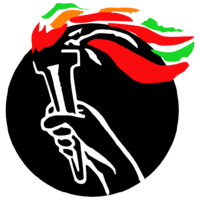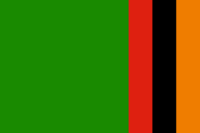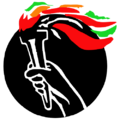United National Independence Party facts for kids
Quick facts for kids
United National
Independence Party |
|
|---|---|
 |
|
| Abbreviation | UNIP |
| Leader | Trevor Mwamba |
| Founder | Mainza Chona |
| Founded | October 1959 |
| Preceded by | Zambian African National Congress |
| Headquarters | Lusaka |
| Ideology | African socialism African nationalism Christian socialism Christian left |
| Political position | Left-wing |
| National Assembly |
0 / 157
|
| Pan African Parliament |
0 / 5
|
| Party flag | |
 |
|
| Website | |
| unipzambia.org | |

The United National Independence Party (UNIP) is a political party in Zambia, a country in Southern Africa. UNIP was in charge of Zambia from 1964 to 1991. During this time, Kenneth Kaunda was the country's president. For many years, from 1973 to 1990, UNIP was the only legal political party in Zambia. As of April 4, 2021, Bishop Trevor Mwamba is the current leader of UNIP.
Contents
The Start of UNIP
Forming the Party
UNIP was created in October 1959. It was started by Mainza Chona. UNIP took over from an earlier group called the Zambian African National Congress (ZANC). ZANC had been banned by the government earlier that year.
When UNIP first began, Mainza Chona was its leader. This was because the previous ZANC leader, Kenneth Kaunda, was in prison. After Kaunda was released from prison in 1960, he became the new leader of UNIP.
Leading Zambia to Independence
In the general elections held in 1962, UNIP won 14 seats. This placed them second behind another party, the United Federal Party (UFP). Even though the leader of the Northern Rhodesian African National Congress, Harry Nkumbula, had a secret agreement with the UFP, he decided to form a government with UNIP instead.
UNIP had a big win in the 1964 elections in Northern Rhodesia. They won 55 out of 75 seats. Because of this victory, Kenneth Kaunda became the Prime Minister of Northern Rhodesia. On October 24, 1964, Zambia became an independent country. Kaunda then became its first president.
UNIP's Time in Power
Ruling as the Only Party
In the 1968 general elections, Kenneth Kaunda was re-elected as president. He received 82% of the votes. UNIP also won 81 out of 105 seats in the National Assembly, which is like the country's parliament.
In 1973, Zambia changed its rules and became a one-party state. This meant UNIP was the only legal political party. A new constitution (the country's main set of laws) was put in place on August 25, 1973. This change was seen as a way to create a "one-party participatory democracy."
How the One-Party System Worked
Under this system, the Central Committee of UNIP made all the important national decisions. The president of UNIP was chosen at the party's main meeting. The second most powerful person in Zambia was UNIP's secretary general.
The constitution also stated that the UNIP president was the only person who could run for president of the country. Every five years, people would vote "yes" or "no" to confirm him in office. For the 125 seats in the National Assembly, voters chose from several UNIP candidates. In the 1973 election, Kaunda was confirmed as president with 89% of the votes. This system continued for elections in 1978, 1983, and 1988. Kaunda always received at least 80% of the votes.
Changes and Challenges
Return to Multi-Party Politics
At the end of 1990, Zambia brought back multi-party democracy. This meant other political parties could exist and compete. In the 1991 general elections, UNIP lost badly to a new party called the Movement for Multi-Party Democracy (MMD).
Kenneth Kaunda was defeated in the presidential election by the MMD candidate, Frederick Chiluba. Kaunda only received about 24% of the votes. In the National Assembly elections, UNIP won 25 seats, while the MMD won 125.
Later Elections and Alliances
After some changes to the constitution, Kenneth Kaunda was not allowed to run for president again. Because of this, UNIP decided not to take part in the 1996 elections. However, two members of the party still ran for seats in the National Assembly.
UNIP returned to compete in the 2001 elections. Kenneth Kaunda's son, Tilyenji Kaunda, ran as the party's presidential candidate. He finished fourth with 10% of the votes. In the National Assembly elections, UNIP won 13 seats.
Before the 2006 elections, UNIP joined forces with two other large opposition parties to form the United Democratic Alliance. The leader of the United Party for National Development, Hakainde Hichilema, was the alliance's presidential candidate. He finished third. The alliance won 26 seats in the National Assembly, which was fewer than the parties had won separately in 2001.
UNIP did not participate in the 2008 presidential by-election. However, Tilyenji Kaunda ran as their presidential candidate in the 2011 elections. He received less than 1% of the votes and finished sixth. The party also did not win any seats in the National Assembly. Tilyenji Kaunda ran again in the 2015 presidential by-election and the 2016 general elections, but he continued to receive very few votes, and UNIP did not win any seats in the National Assembly.
Images for kids
See also
 In Spanish: Partido Unido de la Independencia Nacional para niños
In Spanish: Partido Unido de la Independencia Nacional para niños
 | Jewel Prestage |
 | Ella Baker |
 | Fannie Lou Hamer |



